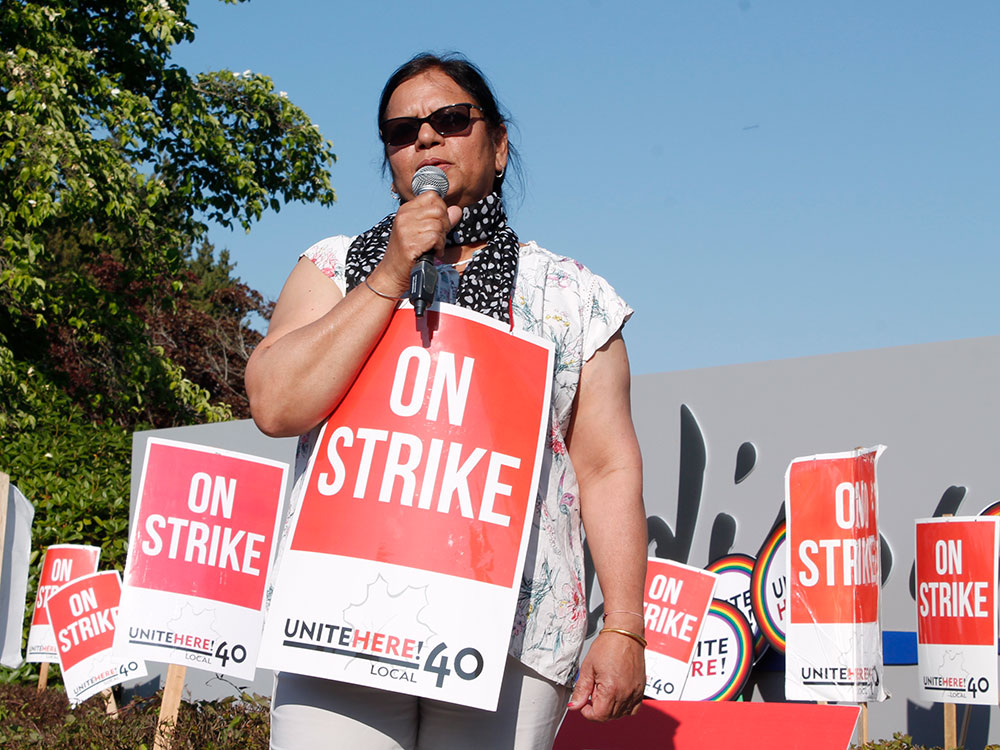British Columbia’s unions expanded at a rate not seen in almost two decades in 2023 as rising costs and government policy supported workers’ bargaining rights.
The BC Labour Relations Board said trade unions submitted 301 applications to organize new workplaces as of Oct. 31 this year, more than double the 143 applications the board received in all of 2022.
The board, which is responsible for tallying votes and approving union certifications, estimates the final numbers for 2023 may be as high as 361.
Both the interim and projected total would be the most applications unions have submitted since 2004, a sign of a resurgent labour movement in B.C. after decades of declining or stagnant private sector union density.
Sussanne Skidmore, president of the BC Federation of Labour, attributes the gains to a law passed last year that made it easier for workers to unionize.
But Skidmore said the resurgent numbers also show workers are frustrated by rising costs and stagnant wages.
“The cost of living, housing, affordability, all of those things, I think, are playing into people seeing the need to collectively organize together and bargain together in a work site,” Skidmore said.
The labour board could not immediately say how many actual workers joined unions in 2023.
But the year has seen a number of massive union drives, including successful pushes in sectors where unions have little to no historical foothold.
At the University of British Columbia, the Canadian Union of Public Employees Local 2278 has applied to represent roughly 3,200 student researchers, the biggest union drive the province has seen in decades.
In Kamloops, workers at an A&W voted to join the International Brotherhood of Electrical Workers, making it the first of those fast-food locations to join a union in Canada.
And in Vancouver, animators at WildBrain voted to join the International Alliance of Theatrical Stage Employees, part of a growing drive to organize workers in that sector.
William Gladman, an international organizer with IATSE, believes a volatile labour market and rising costs helped set the stage for the surge in unionizations. “Something has to give, and people are taking it into their own hands,” Gladman said.
But economics alone don’t explain the gains made by B.C. unions. Labour boards in other provinces don’t report comparable increases in unionization applications.
The secret ingredient in B.C. seems to have been “card check,” a law the BC NDP government introduced last year that allows workers to join a union if 55 per cent of members sign union cards.
Previously, unions had to persuade at least 45 per cent of workers at a given site to sign cards, and then win majority support in a second vote supervised by the labour board.
Gladman said that removing the extra step has made organizing more straightforward, especially in big work sites like WildBrain where the union says there are at least 500 employees in the bargaining unit.
“It’s one thing to reconnect with 20, 30 people,” Gladman said. “But when you have to go back and speak to 500 people again and shore up those votes, that’s a huge undertaking.”
Those gains have not come without a fight. The increase in certifications has been accompanied by a surge of unions complaining employers are trying to stop workers from organizing in violation of the province’s labour laws.
The BC Labour Relations Board said it had received 231 such unfair labour practice complaints in 2023 as of Oct. 31, already nearly double the 122 it received in 2022. The board projected it could receive as many as 277 by the end of the year.
Unions and employers can both submit unfair labour practice complaints for a number of reasons. But Mark Thompson, a professor emeritus at the University of British Columbia and a former labour arbitrator, said most are submitted by unions when employers try to thwart efforts to unionize or achieve a first collective agreement.
This year, for example, the United Steelworkers submitted multiple labour complaints about coffee giant Starbucks. And the union representing BC Ferries workers accused the Crown corporation of trying to sidestep the union entirely in negotiations with some employees.
“You have employers whose instincts are to resist unions. And if you’re in that mindset, it’s very easy to fall into an unfair labour practice,” Thompson said.
It wasn’t just newly unionized workers who had a fight on their hands. This year, strikes were everywhere, from sugar refinery workers in Vancouver to bus drivers in the Fraser Valley and hotel workers in Richmond.
The board’s data indicates that in the first 10 months of the year there were 65 applications under the part of the province’s labour code that governs strikes, lockouts and pickets. There were only 45 applications in the entirety of 2022.
Those figures don’t include strikes or lockouts that fall under the federal labour code, which would include the dockworkers strike that paralyzed the nation’s busiest port as well as a national federal workers strike.
Many of those disputes have revolved around wages. The costs of rent, food and fuel soared in 2022. The Bank of Canada responded to that inflation by raising interest rates, which in turn increased the costs of variable-rate mortgages and borrowing money. And a tight labour market has made it harder to replace workers, giving them the edge in negotiations.
All of that, Skidmore said, had motivated workers to seek bigger wage packages with better protections and benefits.
“Inflation is very disruptive. Union people look to catch up,” Thompson said. “If they signed long-term agreements, they didn’t anticipate the inflation that we saw in the past year. They wanted to catch up, and they want protection for the future.”
Some employers have resisted those demands, leading to weeks- and months-long standoffs.
In Richmond, hotel workers represented by Unite Here Local 40 have been on strike since the summer. At the Rogers Sugar refinery in Vancouver, owner Lantic Inc. and the Public and Private Workers of Canada have yet to reach a tentative agreement after more than 10 weeks of strike action at that facility, which is one of the country’s main sources of domestic sugar.
“I think it’s all tied to the same stuff. It’s all tied to trying to navigate through extraordinary cost of living times with issues around housing, but also health and safety in the workplace,” Skidmore said.
She added one of her main concerns is whether the labour board can keep up.
The board, aside from being a judicial body, acts as referee and mediator in disputes between employers, workers and unions. It typically has to respond within days to disputes over strikes, lockouts or new certification requirements.
Some matters take months. CUPE 2278’s application to unionize research assistants, for example, led to weeks of hearings after UBC argued those assistants are not workers but students receiving scholarships.
In a statement, Labour Minister Harry Bains acknowledged the rising number of certifications and unfair labour practice complaints. The ministry said the Labour Relations Board's budget had increased from $4.2 million in the 2018-19 fiscal year to $6.4 million today. Bains said he was confident the board has the resources it needs.
Thompson said the biggest test for B.C. unions may have shifted to whether they can reach initial collective agreements with employers.
But overall, he said, the momentum has shifted.
“The tides have turned in labour’s favour, and they’re going to take advantage of it,” Thompson said. ![]()
Read more: Rights + Justice, Labour + Industry

















Tyee Commenting Guidelines
Comments that violate guidelines risk being deleted, and violations may result in a temporary or permanent user ban. Maintain the spirit of good conversation to stay in the discussion and be patient with moderators. Comments are reviewed regularly but not in real time.
Do:
Do not: